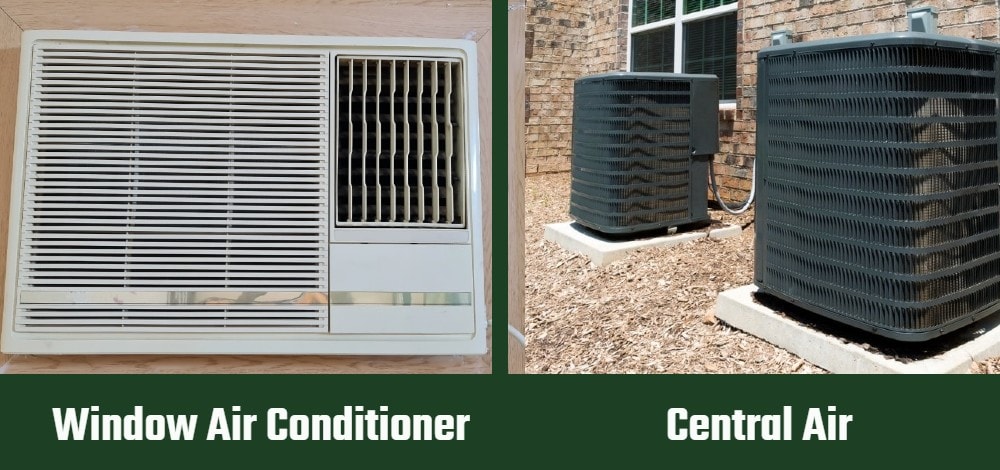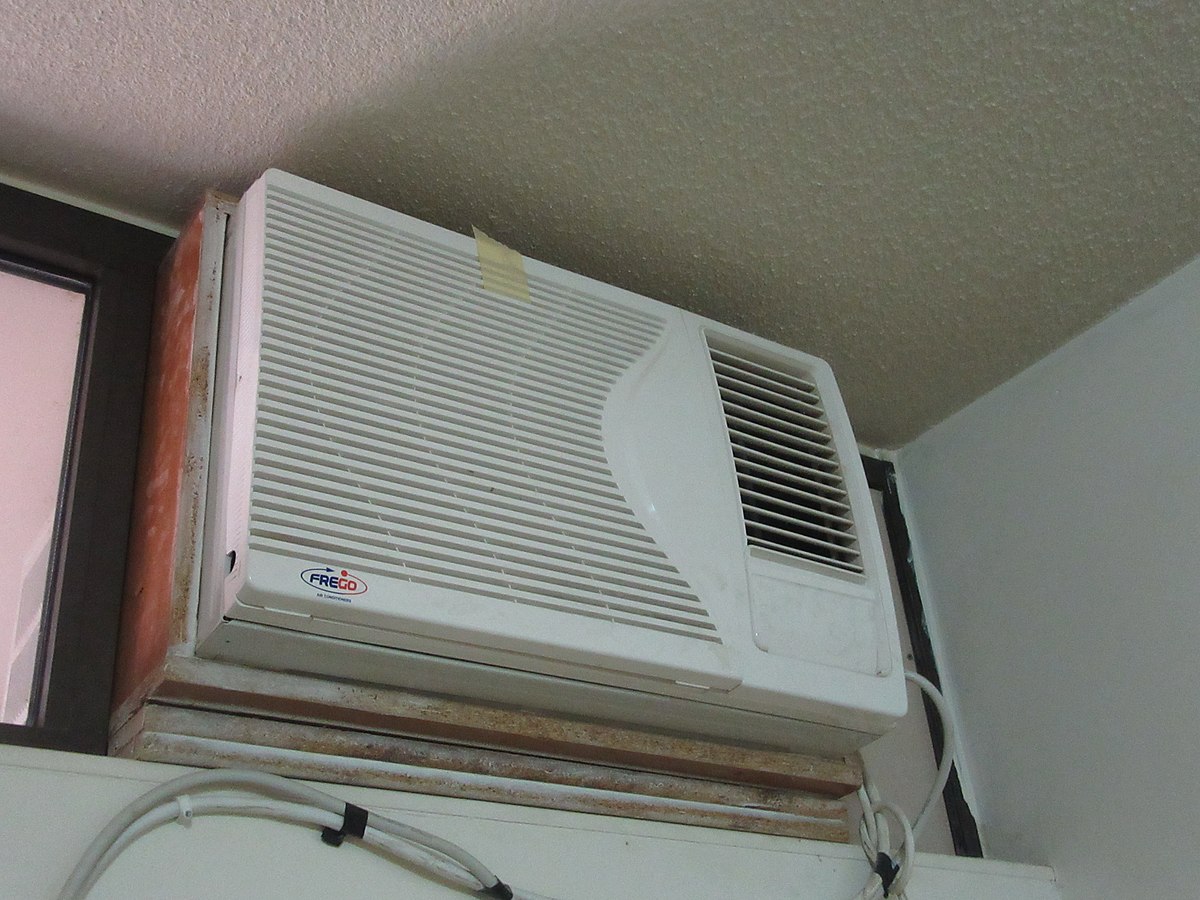Window AC vs Central Air: Pros & Cons
-

- Last updated:

Your choice of air conditioning unit may be situational, if you’re in rented accommodation, your landlord may not allow window AC, but then you might not want to pay for a central air system. But, a window unit and central air system are two of your best options for providing fresh, cool air to your property during the balmy summer months.
Typically, a central air conditioner provides uniform air temperature across an entire house but costs more. A window air conditioner is less expensive, although it can work out more expensive if you have multiple window units and this type of unit is prone to creating pockets of cold and hot air around the windows.
There are other differences, too, and below, we go over the pros and cons of each AC type to help you determine which is the better option for your circumstances.
Overview of a Window AC:
A window air conditioning unit works in the same way as any air conditioner. It drags warm air in from the room and passes it over refrigerant coils. These coils cool the air, which is then pushed back into the room. It is a self-contained unit and attaches in the frame of a window without preventing the window from closing, and it can be moved from one window to another. As the system works, it produces condensation within the air conditioner, and because the condensate must go somewhere, the window unit essentially drips water. Because the AC unit is effectively outside the window perimeter, it typically drips the condensate below where it is fitted.

Installation
Installing a window AC is a DIY job and does not require any previous experience, although having a second person to help with lifting and holding will help. Most units come with an adjustable kit so that it will fit to various windows, but you should check against your window measurements and whether it is a single or double-hung window kit. Although possible, removal can be difficult, so it might be best to leave it in place until you really need to take it off.
Costs
A single window AC is relatively inexpensive, certainly when compared to whole-house or central-air systems. However, one unit will only usually work to cool the air in one room. This means that you may want multiple units to cover a whole property. The size and efficiency of the unit ultimately determines its price, but you should expect to pay up to several hundred dollars each. This means that the total cost can reach $1,000 or more even if you only want three window units.
Cooling Efficiency
A window unit is a single unit, and it can only pull air in from the local vicinity, and pump air out into the same vicinity. Modern units are better at ensuring uniform temperatures around a whole room, but there will still be pockets of cold air around the window unit. As you move further away from the air conditioner, the air temperature will get warmer, too. What’s more, without purchasing multiple window units to go in different rooms, a window AC will only work in the room that you install it. This might be enough for your air-cooling requirements, but it is something to bear in mind.
- A single unit is inexpensive
- Installation is a DIY project
- Can be removed and taken with you if you move
- Only works in one room
- The cost of multiple units soon adds up
- Creates pockets of cool air and leaves warmer areas
Overview of Central Air Conditioning:
Although a central air conditioner works on the same basic principles as a window AC, it is more complex and goes about its job slightly differently. It uses your home’s furnace or air fan to draw air in out of rooms and then passes the air over an evaporator coil to remove warmth from the air, before passing cool air back out of the air vents. Condensate gathers in a condensate pan, which feeds to a drain and the water is taken away. A central air conditioner is a permanent fixture and cannot be removed, although additional vents and intakes can be added, at cost.
Installation
Installation is not a DIY job and depending on your existing home setup, it can cost several thousand dollars to have a new system put in a home. The equipment alone can cost $4,000 or more, with installation adding another $2,000 or more, and these are just the costs for a relatively small home. Costs do vary according to property size and condition, as well as the area in which you live, and it is worth getting a quote to determine exact prices.
Costs
As well as the cost of purchasing and having the air conditioner installed, you need to consider the ongoing costs. A single window AC can cost approximately $50 to $100 per month, to run, but a central AC attracts higher running costs because it tends to operate in every room and throughout the property. It also uses the furnace in your home, which further adds to the cost.
Cooling Efficiency
A central AC does cost more than having one or two window air conditioners, but many homeowners consider this a price worth paying because it offers uniform air cooling throughout the property, does not have cold and warm pockets, and is generally a more efficient cooling system. It also means that you don’t have somewhat bulky AC units attached to your windows. Central air conditioners can also filter the air, which means that they remove pollutants and allergens. While window ACs are getting better at this, they are still not as effective as central air systems.
- Cools the whole house
- No bulky window AC units
- Effective at removing pollutants and allergens
- Does not cause cold air pockets
- Expensive to buy
- Expensive to install
- Expensive to run because it uses the home’s furnace
Do You Need AC In the Whole House?
Not only does air conditioning cool the temperature of rooms but it improves air quality, can help prevent insects and pests, and it can reduce the humidity levels in your home by venting and replacing air. With that said, if you are only looking to cool one or two rooms, a central air system can be prohibitively expensive and unnecessary. Although it depends on the cost of the window units and the overall cost of a central system, buying up to four window units will still usually be cheaper than a whole house system.
Which Is Cheaper?
If it comes down to a purely financial decision, buying one or two window units is the cheaper option for initial and ongoing costs. However, if you do want to air condition several rooms, it may prove financially viable to buy a whole house system. Get quotes for both and compare the prices, because costs can be affected by factors including the condition of your home. You may find that you need to upgrade your home furnace for a central unit, which means yet more cost.
Do You Own or Rent Your Property?
If you own your own property, you should have the option of installing window or central air conditioning, but this may not always be the case. If you own an apartment, the building owner or any housing group may prohibit the installation of window air conditioners because they do drip water below and the building owner might consider them an eyesore. Similarly, you will need permission to have a central air conditioner installed, but this is usually more easily given. If you rent your property, bear in mind that you can uninstall and remove a window AC so you can take it with you. You can’t take a central AC with you.
Window Availability
Some properties are blessed with an abundance of windows, but some only have one or two windows per room. Even if you have a spare window, you need to consider whether you want a window air conditioner taking up that window space because once installed, you won’t benefit from being able to fully open the window and there will always be an air conditioner blocking light and preventing you from seeing out. With a central air system, you are free to use all your windows as you see fit.
Check You Have Permission
In either case, you should not require planning permission to install air conditioning. A central system does not affect the exterior of the property and a window unit is relatively small and is considered a temporary addition. Whether you live in rented or owned accommodation, you may need permission from a building manager or other property owner, for either type of system, so check any agreements and consult with the building owner, if necessary.
Conclusion
Air conditioning not only cools the temperature of a property, but it can replace stale air with fresher air that is free from allergens and other pollutants. There are many options when it comes to choosing type of air conditioning unit, including window ACs and central air system. Central air systems are more convenient to use and can cool all the air in a house, but window units are cheaper and can be removed and taken with you when you move.
Featured Image Credit: Left: Window AC (Kamran Younus, Shutterstock) | Right: Central Air (Konstantin L, Shutterstock)
Contents



